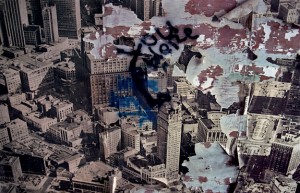
"Red Dawn 2" recently filmed in Detroit, not needing to dress down it's buildings to make is seem the site of a devestating invasion. (Image by Yves Marchan and Romain Meffre.)
Are we fascinated by the modern ruins of Detroit because they seem otherworldy or because they seem like our future?
The Motor City, shattered by financial apocalypse, has become the popular subject of ruinsploitation books and articles and photo series. Some urban analysts believe that’s because because we subconsciously fear Detroit is a harbinger of what lies ahead for us all. It seems melodramatic, but a good article by John Patrick Leary in Guernica wonders about that very idea. (Thanks Essayist.) An excerpt:
“For media workers from more prosperous cities, Detroit’s spaces of ruination appear to tell a history, or at least evoke a vague sense of historical pathos, absent in those other, wealthier cities. Indeed, one of the notable features of this Detroit boom is the fact that few of the people driving it actually live here. For someone from New York, Paris, or San Francisco, history seems more visible here, and this is the visual fascination that Detroit holds. As [Yves] Marchand and [Romain] Meffre write on their website, ‘Ruins are the visible symbols and landmarks of our societies and their changes, small pieces of history in suspension.’ In a country perennially plagued with a historical amnesia, ruins are rare permanent reminders of a history unsuited to the war memorials and equestrian statues that dot the national landscape. Another reason for the fascination with Detroit’s decline is less about history, though, and more about the future.
Coleman Young, Detroit’s charismatic and still-controversial mayor during the years of the city’s most precipitous decline in the nineteen seventies and eighties, put it well in his fascinating 1994 autobiography, Hard Stuff: ‘Detroit today,’ he wrote, ‘is your town tomorrow.’ From the 1967 riots, when Detroit became the flashpoint of the country’s political and racial crisis, to the deindustrialization and crime of the nineteen seventies and the nineteen eighties, the city has been a bellwether of each major urban crisis since World War II. Today, Detroit, to use an overused but appropriate metaphor given the city’s scarred appearance, is ‘ground zero” of the collapse of the finance and real estate economy in America. Detroit has been hit as hard as any city by the foreclosure crisis and by unemployment, and so it embodies the looming jobless future, or more precisely, our worst fears about that future.”
